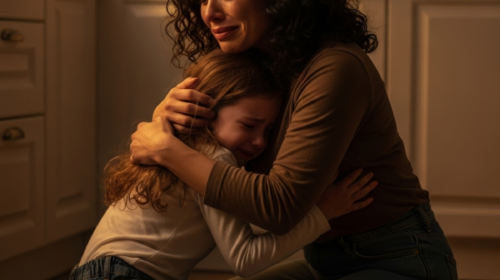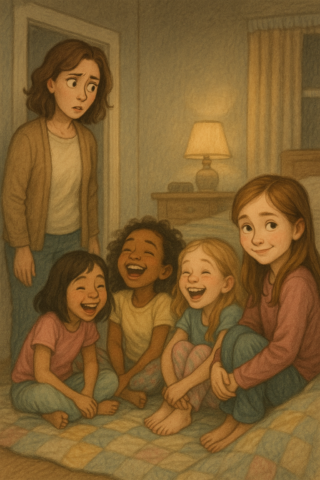Emma never dreamed of becoming a stepmother.
When she married Daniel, she imagined she was starting a new chapter of companionship and shared dreams. She looked forward to slow Sunday mornings, shared dinners, and the quiet comfort of partnership. What she hadn’t expected was that her vows would come with two wide-eyed children staring at her from across the hallway—children who didn’t smile when she walked in, who didn’t call her anything at all.
She thought she was gaining a husband—not a readymade family.
Six-year-old Sophie was sweet, but sensitive. Any firm word from Emma brought on tears. Ten-year-old Ben, on the other hand, was a fortress of silence. He would sit at the dinner table like a statue—eating quietly, head down, answering questions with a nod or a shrug.
Their home, instead of being filled with the warmth Emma had hoped for, echoed with tension. She would try to make pancakes for breakfast—Daniel’s favorite—but the kids would pick at them. She would suggest a family movie night, and the kids would excuse themselves early or stare at their phones.
Emma felt like a ghost in her own house.
And with every failed attempt to connect, something hardened inside her. Not because she was cold-hearted, and certainly not because she hated the children. The truth was far more painful: she didn’t know how to love them.
“I’m not their mother,” she would whisper to herself in the quiet of the night, curled up on the couch while Daniel worked late in his study. “They don’t need me… they’ll never love me.”
What began as distance became a wall. Invisible at first, but growing stronger and thicker with each passing day. She did what needed to be done—cooked meals, folded laundry, kept the house clean. But she didn’t try anymore. She didn’t reach out. She stopped smiling at the dinner table and started eating in silence too.
Daniel noticed. Of course, he did. But what could he say? His heart was torn in two. He loved his children, but he loved Emma as well. And he couldn’t bridge the gap between them, no matter how hard he tried.
Emma, meanwhile, felt herself sinking deeper into a loneliness she had never known before. It was worse than being single. Back then, she had only herself to care for. Now, she lived in a house full of people, and yet felt entirely alone.
Until one rainy Thursday night.

The evening had gone as usual—tense and quiet. Ben had refused to eat the vegetable stew Emma had made. Sophie had spilled her juice and cried when Emma snapped at her. Daniel had tried to smooth things over, but the weight in the room was too heavy. Eventually, the kids went to bed without a word, and Daniel retreated to his study.
Emma sat at the kitchen table, staring at her untouched cup of tea. The clock ticked past midnight. The rain tapped steadily against the windows. And quietly, so quietly, Emma began to cry. Not loud sobs—just silent tears that slid down her cheeks as she sat in the dark kitchen with the soft hum of the refrigerator for company.
She didn’t hear the footsteps at first. It wasn’t until she felt a small hand on her shoulder that she looked up, startled.
It was Sophie.
The little girl stood in her pajama onesie, her eyes puffy from sleep—or maybe from earlier tears. She didn’t say anything at first. Just stood there, uncertain.
Emma blinked, hastily wiping her tears.
“What are you doing out of bed, sweetheart?” she asked, her voice hoarse.
Sophie hesitated, then stepped closer. She looked so small, standing there in the dim light. So vulnerable.
Then she whispered the words that shattered Emma’s wall in one blow:
“Mom… can I hug you? Even if you don’t love me?”
Emma’s heart broke.
It didn’t crack. It didn’t shift. It broke wide open.
She pushed back her chair, knelt down, and pulled Sophie into her arms, holding her so tightly she feared she might crush her. And then she cried. Deep, shuddering sobs she hadn’t allowed herself in years. Sophie held on to her just as tightly, her tiny fingers gripping the back of Emma’s shirt.
“I do love you,” Emma whispered again and again, her tears soaking Sophie’s curls. “I’m so sorry, sweetheart. I just… I forgot how to show it.”
That night was the turning point—not magical, not perfect—but real.
The next morning, Emma woke up early and made waffles, Sophie’s favorite. Ben didn’t smile, but he did eat two full plates. That was a start.
Over the next few weeks, Emma made small changes. She started sitting beside Ben during meals, even if he didn’t say much. She began helping Sophie with her homework, offering encouragement instead of correction. She stopped trying to “win” their affection—and started simply being there.
She apologized more. She listened more. She asked questions—not to pry, but to understand. She started showing up in the ways that mattered.
And slowly—beautifully—things began to shift.
Sophie started calling her “Mom” without hesitation. Ben began to respond in full sentences, even cracking a joke one evening that made Daniel spit out his drink. Emma laughed too, really laughed, for the first time in months.
There were still hard days, of course. Times when old wounds reopened, or when Emma second-guessed herself. But now, she didn’t retreat. She leaned in. She remembered that moment in the kitchen, and the warmth of that tiny hug that had changed everything.
She stopped seeing herself as “stepmother.” The label didn’t matter anymore.
She was simply Mom.
Final Thought:
Love doesn’t always arrive in perfect packages. It’s not always instant or easy. But when it’s built with patience, nurtured with forgiveness, and given room to grow, it can transform even the most fragile relationships into something unbreakable.
Blood might create families, but it’s the courage to love that makes them whole.


